Assuming you just want a bit of obfuscation rather than proper cryptographic security, I'd suggest using a set of linear congruential generators to transform your integers into non-sequential values that you can then convert into base-26 values where each digit is represented by a letter of the alphabet (e.g., a=0, b=1, ..., z=25).
You'll need a different LCG for strings of each length, but these can be generated quite easily. Also, the input values will have to be adjusted so that, for example, the first two-character string corresponds to an input value of 26. (I'm counting from zero, since this makes the maths a bit more straightforward.)
For example, suppose you start with a value of n=12345. The first thing you need to do is figure out how long the output string needs to be:
n = 12345 # Input value
m = 26 # LCG modulus
k = 1 # Length of output string
while n >= m:
n -= m
m *= 26
k += 1
print(k) # Should be 3 in this case
print(n) # Should be 11643 (=12345 - 26 - 26**2)
Next, transform this output value of n with an LCG having a modulus of m=263 (for a 3-character output). For example, you could try a=7541 and c=12127. (Make sure the values you choose correspond to a maximal length sequence according to the Hull–Dobell theorem as described in the Wikipedia article.)
n_enc = (n * 7541 + 12127) % (26**3) # Should be 2294
In base 26, the mumber 2294 is represented as 3×262 + 10×26 + 6, so the final output will be dkg.
To reverse this process, convert the base-26 string back into an integer, apply the inverse LCG function
n = ((n_enc + 5449) * 3277) % (26**3) # Should be 11643
and add back on the smaller powers of 26:
while m > 26:
m //= 26
n += m
One slight wrinkle in this method is that if the length of your alphabet is not divisible by any squares greater than 1 (e.g., 26 = 2×13 is not divisible by 4, 9 or 16), then the LCG for single-character strings is inevitably going to produce sequential results. You can fix this by using a random permutation of the alphabet to represent the base-26 numbers.
I should also add the standard caveat that random strings of alphabet characters can sometimes spell words that are offensive or inappropriate, so you might want to consider restricting yourself to a disemvowelled alphabet if these strings are going to be visible to users at all.
